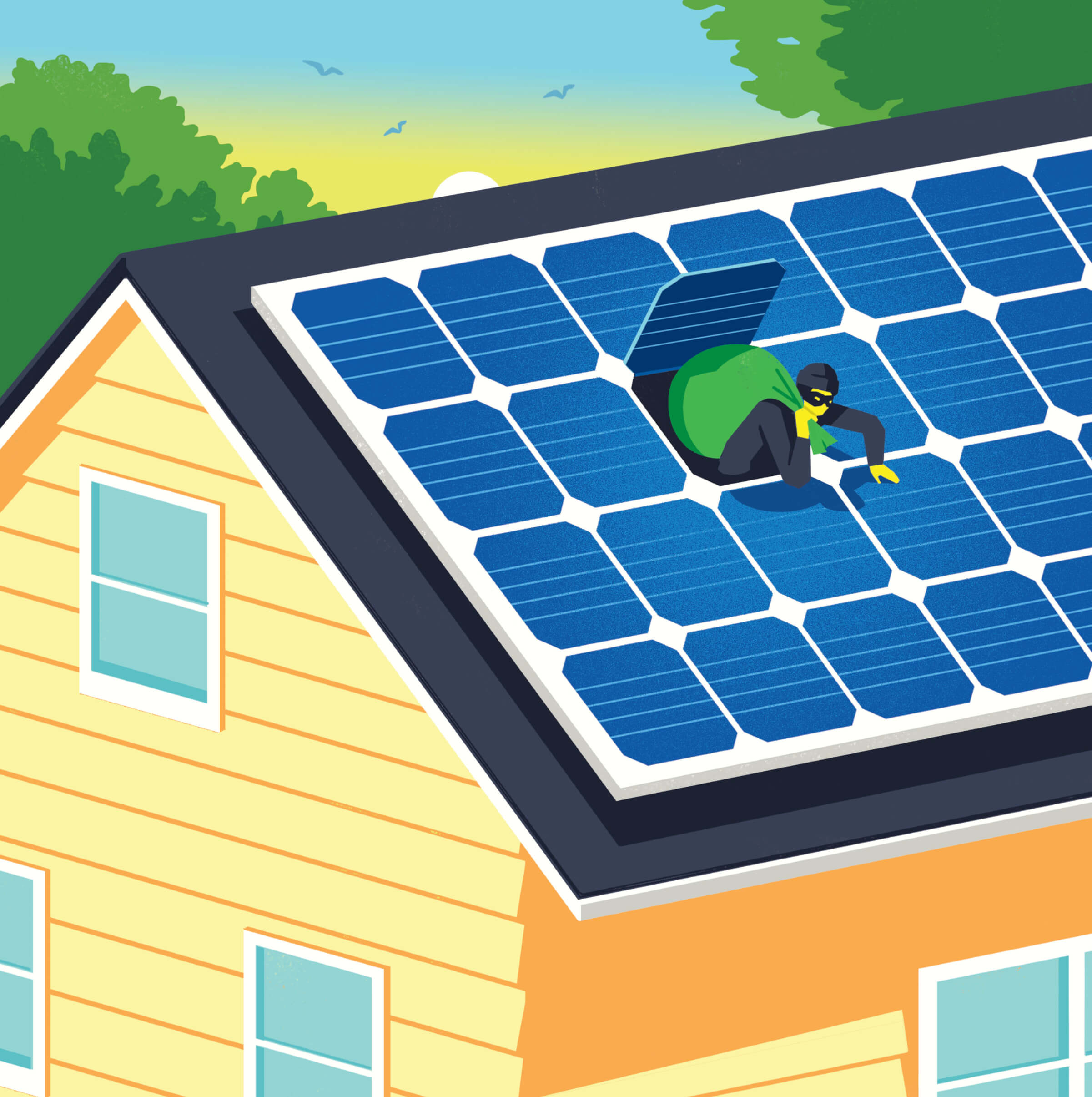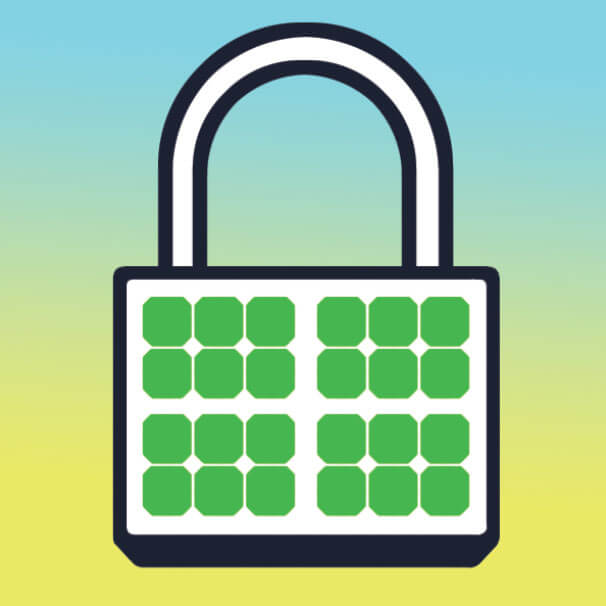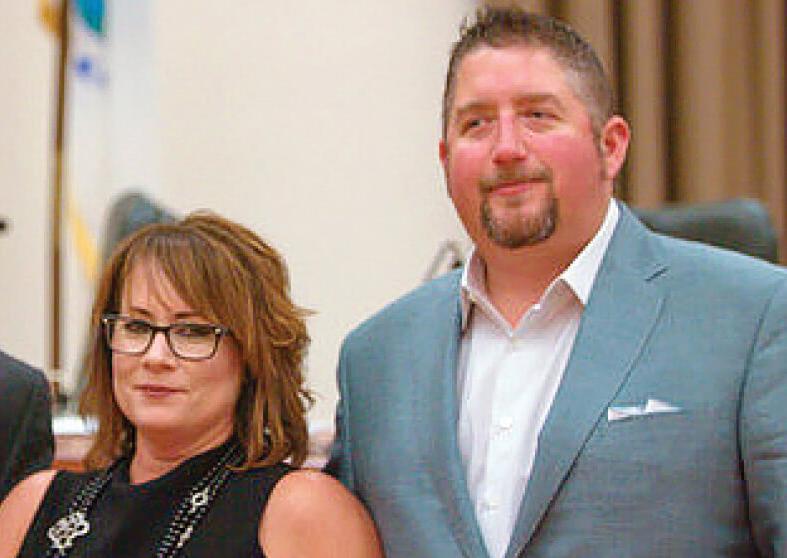Your Money: Fraud Watch
CLEAN ENERGY SCAMS SURGE
From green and clean to solar to renewable, energy scams are bilking consumers out of thousands of dollars. Here’s how to spot and sidestep them

Carliss Wileman wasn’t really interested in solar panels for her New Caney, Texas, home. But when a solar-energy salesman stopped by in May 2022 promising no more electric bills and a $30,000 tax rebate, she signed a form on his iPad that she thought was just paperwork. “Now I have an $89,000 loan, 50 panels on my roof and my porch leaks,” says the 75-year-old retired bar and restaurant owner.
Wileman says she never applied for the loan, never received a tax incentive because she doesn’t pay income tax and her solar panels “may work a little, but my electric bills are higher for some reason.”
She’s not alone. Fueled by a drop in solar panel costs, an urge to fight climate change, the availability of real but sometimes confusing government incentives and a desire to save on rising energy bills, solar panel scams are hitting consumers across the United States. “I think it’s a perfect storm,” says Minnesota Assistant Attorney General Noah Lewellen. “There are a lot of start-up companies,” and some make promises that never come true.
The sales pitch often starts with a solar salesperson knocking on the front door, calling on the phone or connecting via social media. “Solar has so much potential for good. It’s a real shame a handful of bad actors are giving it a black eye,” says Philadelphia-area consumer protection lawyer Andrew Milz. “People think they’re doing something good for the environment and it should eliminate their electric bill, but that’s not always the case.”
Authorities are taking steps to protect consumers. Attorneys general in at least 15 states have investigated or filed suits against solar installers and lenders. In May, the Nevada State Contractors Board started a solar investigations unit. But the scams continue. Older adults may be especially vulnerable because many are home during the day and may be more likely to open the door to solar salespeople or answer phone calls, Lewellen says.
RENEWABLE ENERGY SCAMS ABOUND
Criminals use the lure of clean, green, renewable energy to steal consumers’ money in other ways too.
Scammers exploit the “green halo” around renewable energy to pull victims in, says Robert Mascio, director of Investor Education Outreach at the not-for-profit Financial Industry Regulatory Authority (FINRA). “Scammers take advantage of people’s inclination to do good,” Mascio says. In a 2023 Stanford University survey of 993 investors, 76 percent of people 58 and older said they were concerned about the environment and about 30 percent were willing to lose a little money to help clean it up.
But investors have lost millions in recent years to fake green energy companies such as a California Ponzi scheme claiming it was converting cow manure into methane gas for generating electricity. “Don’t rely on marketing hype,” Mascio says. “Do your homework before investing.”
Start investigating whether a green energy investment is a scam or an opportunity by checking whether the seller is a licensed broker on FINRA’s BrokerCheck, at brokercheck.finra.org, Mascio suggests. Skip schemes that sound too good to be true. And “walk away from unsolicited investment offers, whether directed to you through mail, social media, chat rooms, text message or phone call,” he says.
Some clean energy come-ons are a ruse to get your personal identifying information. In June, Huntsville Utilities in Alabama warned residents about callers posing as utility representatives offering cheap solar panels, then gathering personal financial data and homeownership information. Utility company workers will never reach out to you asking for your Social Security number, credit card number or bank account information—but impostors will, utility companies and police departments across the U.S. warn consumers.
Clean energy scammers often employ similar tactics, experts say. They include:
▶︎ A special deal if you act right now.
If you feel pressured to act immediately on a solar or other renewable energy deal, just say no, advises Melanie McGovern, spokesperson for the Better Business Bureau. “High pressure is where people could end up losing money,” she says.
If you’re interested in solar panels, take time to research costs and benefits on your own by getting bids from several contractors in your area, suggests Amy Nofziger, director of victim support for the AARP Fraud Watch Network. Check first that installers are licensed, certified and/or registered with organizations such as the North American Board of Certified Energy Practitioners (nabcep.org). Look for complaints and problems by visiting the Better Business Bureau national business directory at bbb.org/search.
Your state’s department of energy or consumer protection bureau may have a list of qualified solar installers or information to let you know whether a contractor is registered and/or licensed. To learn about states’ solar licensing requirements for contractors, check the Interstate Renewable Energy Council’s national database at irecusa.org/solar-licensing-database.
▶︎ Getting signatures under false pretenses.
Consumer advocates, scam victims, attorneys and state prosecutors warn that scammer salespeople may misrepresent the reason they want your signature or initials, then misuse them to open a loan in your name and OK panel installation. “I signed what I thought was a form to pre-authorize a loan just in case, and ended up with a $42,000 solar panel loan I never wanted or asked for,” says Neda Yarnall, 50, a New Jersey real estate agent who in June filed a class-action lawsuit against a financial lender involved with solar panel financing.
▶︎ Promising free solar panels, big tax credits and no more electric bills.
“The federal government does not have any programs that install solar panels on the homes of Americans for free,” according to the U.S. Department of Energy. To learn more about whether the federal solar investment tax credit and state subsidies for solar installations would benefit you, go to the DOE’s Solar Energy Technologies Office at energy.gov/eere/solar/solar-energy-technologies-office. The Internal Revenue Service has a fact sheet about residential clean energy on its website. You can also ask your utility company about how solar panels would affect your electric bill. Close to signing a contract? “Have an attorney review it first,” McGovern says.
▶︎ Undisclosed fees tacked onto solar loans.
Do your own search for financing, suggests Minnesota Assistant Attorney General Adam Welle. State investigations found unscrupulous solar lenders tacked a 10–30 percent fee onto loans and increased monthly payments if consumers didn’t turn over their tax savings to the lender.
How to Dodge These Scams

Watch for impostors. Solar scammers may say they’re consultants from your power company, utilities warn. Ask for ID.

Do not sign or initial papers or electronic devices on a cold call or before reading contracts and documents.

Slow down—and do your own research. Don’t get pressured into signing or giving away personal info.

Keep personal information private. Don’t give away personal data to anyone who contacts you about a green energy opportunity.

BILLION DOLLAR SCAM
Jeff and Paulette Carpoff and others stole roughly $1 billion in what was basically a Ponzi scheme in which investors paid for thousands of “solar generators” that did not exist. Federal agents say much of the money was siphoned off to fund a lavish lifestyle for the couple. A federal judge in California sentenced Jeff Carpoff to 30 years in prison in 2021 and his wife to more than 11 years in prison in 2022.
Have questions related to scams?
Call the AARP Fraud Watch Network helpline toll-free at 877-908-3360. For news and advice, go to aarp.org/fraudwatchnetwork.
Sari Harrar is a contributing editor to AARP The Magazine and the AARP Bulletin. She writes frequently on health and fraud topics.